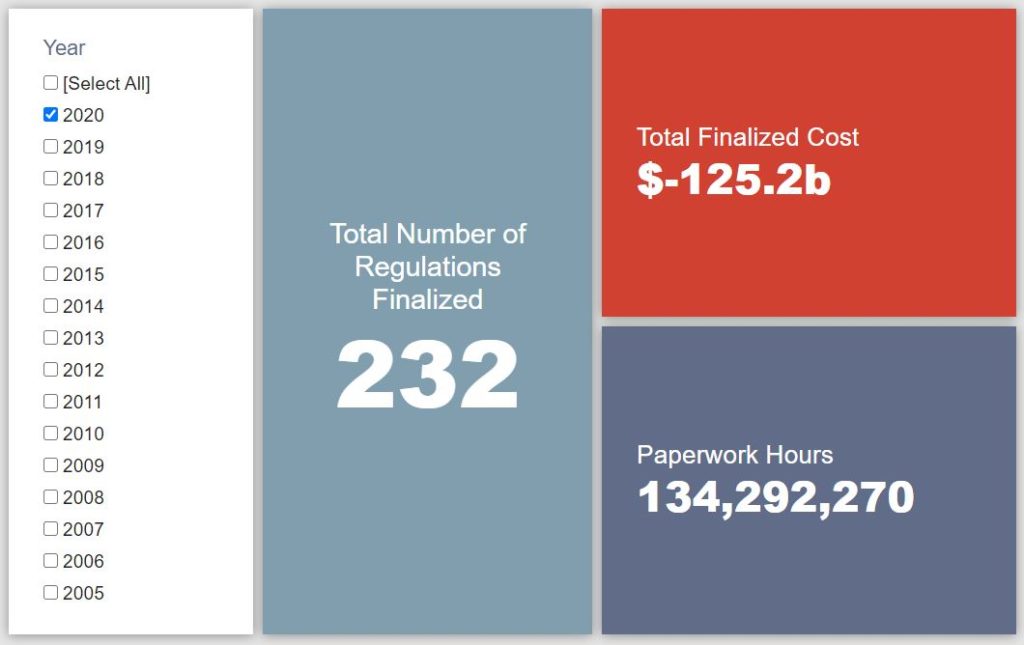Week in Regulation
August 17, 2020
Many Rules, Moderate Impact
Last week was a relatively busy one in the pages of the Federal Register. There were 15 rulemakings with some measurable economic impact estimate. Only one, however, was a cost-cutting measure. Despite the relative uptick in volume, the cumulative effect of all these rules was somewhat middling. Across all rulemakings, agencies published $344.4 million in total net costs and 277,098 hours of annual paperwork.
REGULATORY TOPLINES
- Proposed Rules: 30
- Final Rules: 51
- 2020 Total Pages: 49,872
- 2020 Final Rule Costs: -$125.2 billion
- 2020 Proposed Rule Costs: $7.9 billion
TRACKING THE REGULATORY BUDGET
The most notable regulatory action with implications for the fiscal year (FY) 2020 regulatory budget was a rule from the Food and Drug Administration (FDA). The rule sets new standards by which manufacturers of fermented or hydrolyzed foods can label their products as “gluten-free.” As FDA puts it, the issue with these products is that there is “no scientifically valid analytical method effective in detecting and quantifying with precision the gluten protein content in fermented or hydrolyzed foods in terms of equivalent amounts of intact gluten.” Because of this conundrum, this rule directs manufacturers to: A) show that the food is “‘gluten-free’…before fermentation or hydrolysis,” and B) ensure that this is no “cross-contact” with gluten during the process. FDA estimates that the administrative burdens involved in keeping the relevant records on this would impose roughly $107 million in total present value costs.
The Trump Administration expected to reach $51.6 billion in cumulative net savings in FY 2020. To date in the fiscal year, agencies have officially published 116 deregulatory actions and 42 regulatory actions, totaling $169.9 billion in quantified total net cost savings.
THIS WEEK’S REGULATORY PICTURE
This week, the Department of Justice (DOJ) issues a report on reforming the Administrative Procedure Act (APA).
Source: https://www.justice.gov/opa/pr/justice-department-releases-report-modernizing-administrative-procedure-act
On August 12, DOJ issued a report titled “Modernizing the Administrative Procedure Act.” The report is primarily a transcript of a summit held in December 2019 with the same title. The report outlines ideas by which the nearly 75-year-old APA can be improved to deal with the modern administrative state.
The report is based on the premise that while the APA has been critical in establishing the baseline structure of the American regulatory process, with such elements as requiring notice and comment opportunities, it was in need of reform almost immediately after its enactment. As Deputy Attorney General Jeffrey Rosen notes in the foreword, every administration since its passage has “recognized that the APA’s procedures alone are insufficient to promote efficiency, accountability, transparency, and public participation.”
The report finds that APA reform is overdue for two broad reasons. The first is that the federal judiciary has substantially altered the regulatory process through precedent setting court decisions. The second is that administrations have instituted reforms unforeseen at the time of the APA’s enactment, such as the creation of the Office of Information and Regulatory Affairs.
The most specific reform discussed in the report is the Regulatory Accountability Act (RAA). The legislation, which has been introduced in five consecutive Congresses, would reform the regulatory process in several ways. These ways include additional rigor for rules that are “high impact,” or cost $1 billion or more over a 10-year period, and codify the many executive orders and court decisions affecting the regulatory process.
While the report notes no consensus was formed over any particular reform, one theme was constant: Congress needs to act to modernize the regulatory process.
TOTAL BURDENS
Since January 1, the federal government has published $117.3 billion in total net cost savings (with $125.2 billion from finalized rules) and 152.7 million hours of net annual paperwork burden increases (with 134.3 million hours due to final rules). Click here for the latest Reg Rodeo findings.













